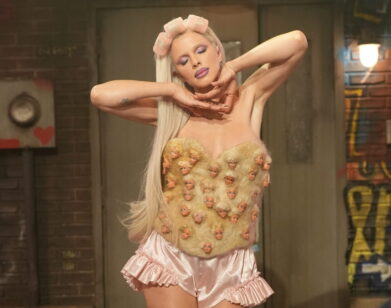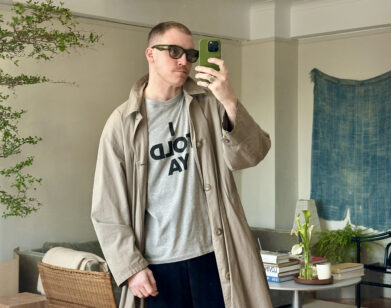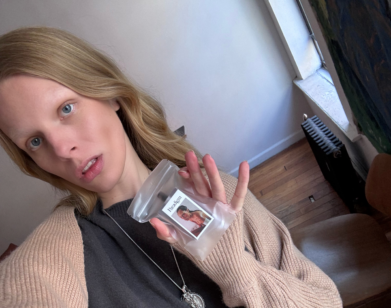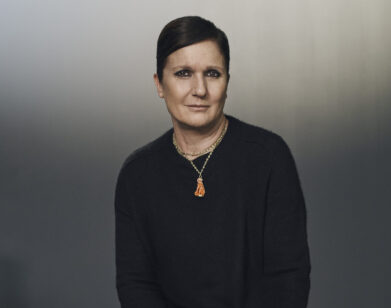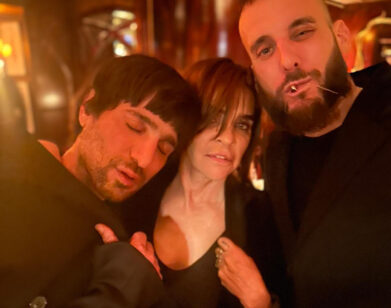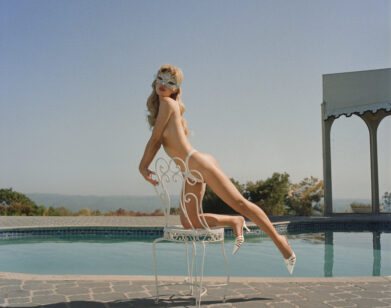Donatella Versace

Donatella Versace

In the past few years, when the ’80s came back in a big way on runways, the one house with the greatest claim to (and archives of) that decade resisted the backward glance. Donatella Versace, who took the reins of the 31-year-old family brand in 1997, has marked herself not as a designer soaking up glamour by osmosis, but as one of the few fashion masterminds who has been able to connect the essential values of sexiness and the body with an interest in new fabric technology. Basically, Donatella is a woman obsessed with the future. Sure, she loves to sit around at extravagant dinners with her friends and family, talking about love and life. She’s Italian. And she has great stories of her days with her brother Gianni, a man who defined the ’80s and then went on to create the ’90s. But Donatella’s own story is all about going forward. She’s a huge music junkie, cranking up the volume while she works on the men’s and women’s collections in her Milanese studio. (Maybe she’s been listening to Metallica lately, because metal plays such a key role in her Fall collection). One of her favorite soundtracks is the rock refrains of her longtime friend Lenny Kravitz, who was doing his own looking back this year with the 20th anniversary re-release of his first album, Let Love Rule. The two caught up to talk about fashion, music, and family—past, present, and future.
DONATELLA VERSACE: How long have we known each other? For almost 20 years now.
LENNY KRAVITZ: Almost. A little less, because I met you just after my second album came out. It was when Gianni had that big show at the ParkAvenue Armory in New York. Do you remember?
VERSACE: Yes, of course I do. That was 1992.
KRAVITZ: I believe that was actually the first time that a rock ’n’ roll band was onstage during a fashion show.
VERSACE: It was the very, very first time in fashion, when Gianni asked you to come and perform for us. It was amazing. All the supermodels were there: Cindy, Naomi, Christy . . . It was a magical moment.
KRAVITZ: It was to raise money for AIDS, too, right?
VERSACE: Yes, a charity for AIDs. The runway went from one side of the hall to the other, with the models coming out one way and going back another. And there was Lenny performing.
KRAVITZ: Those were the supermodel days! [laughs]
VERSACE: Whenever I see Cindy or Christy, they still talk about that day. They ask, “Why don’t we do something like that again?”
KRAVITZ: Why don’t things like that happen more often?
VERSACE: The reason that happened was because Gianni was a pioneer. And me, too, because I love mixing fashion and music . . . It runs in the family.KRAVITZ: So I’ve been thinking about what to ask you, and I wanted to stick to things I never really knew about you. When we’re together we talk about family and our personal lives more than work. But I know that for me, fashion and music all started at home. I first learned about fashion by going into my mother’s closet. I used to put on her boots and her scarves and dress up as Jimi Hendrix. What was it like for you as a child? Were you playing dress-up all the time?
VERSACE: I have to say, I grew up with fashion because my mother was a seamstress, and she had an atelier. She would cut the first pattern, and then she had people working for her. So I grew up in an atelier, watching people all around me sewing. I was fascinated. When my mother did fittings for her clients, I was hiding, looking at these beautiful ladies try on these fantastic clothes. I was dreaming as a small child to try these clothes on myself. And, of course, growing up with Gianni, he brought me even further into it. Gianni was almost 10 years older than I, but he was in love with fashion. When I was about 10 or 11, Gianni started to play with me being his model. [laughs] He’d try clothes on me and ask, “What do you think?” He was pushing me to do my hair lighter—to bleach it. So I was a fashion addict by the time I was 11 years old. I’d wear a miniskirt and patent-leather boots.
KRAVITZ: Wow. At 11?
VERSACE: Yeah. I looked almost as I do now, the only difference being that I was 11. [laughs] I was a very mature little girl because I was always with Gianni.
KRAVITZ: How many brothers and sisters are there, in total?
VERSACE: There were three of us: me, Gianni, and one brother two years older than Gianni. He’s still alive, of course.
KRAVITZ: From the age of 11 until now, you’ve seen a lot of clothes, owned a lot of clothes, and made a lot of clothes. Is there one piece that you particularly cherish? Maybe something that Gianni gave you . . .
VERSACE: When Gianni started to do metal-mesh for his collection, the first metal-mesh piece he did was for me. It was in the mid-’80s. He did a really long, black metal-mesh dress, which was the Swarovski dress. And he did a black leather blouson to wear on top, which was very radical at that time—a leather blouson over a long evening dress. I loved it. I loved the contrast. It was very rock ’n’ roll. Gianni had that very rock ’n’ roll feeling, which I still love. And I cherish that outfit. I keep all of Gianni’s clothes in the archive, but that particular piece I keep at my house.
KRAVITZ: Sounds very sexy.
VERSACE: Yes, it is.
KRAVITZ: Sexiness has always been something that’s closely associated with Versace, from your brother’s time to yours now. Does the idea of sensuality and sex enter your mind when you’re designing a collection?
VERSACE: I think that’s instinctive, that it comes naturally. I don’t think about making sexy clothes. It’s just my instinct to make them. [laughs] It comes to me when I’m working. I think sex is part of life, like eating and breathing. Obviously you think of sexy in a different way than you did in the mid-’80s or early ’90s. We didn’t strive to make sexy clothes then either, because you didn’t want to say out loud, “This is a sexy outfit.” You wanted to express that in either a more innocent way or a more sophisticated way. But you always want to feel sexy. You want people to look at you and say, “Wow.”
KRAVITZ: Speaking of the ’80s, in the last few years, off and on, there’s been this big return to that decade. My daughter, Zoë, she’s 20 years old, she’s dressing very ’80s—that’s what’s chic right now. I was dressing very ’70s when I started. I see that you’ve largely resisted that trend in your collections and gone away from that. Which wouldn’t have necessarily been a surprise for Versace to embrace.
VERSACE: I knew that trend was coming. I knew exactly when every designer was going to start doing it. And I couldn’t, because I was with Gianni doing the ’80s, in the ’80s. I have so many pieces in the archives that I could put right out on the runway and they’d be perfect. [laughs] In general, I think, yes, we can look back, but not that much. It’s too literal. Like shoulder pads. We belonged to that time. But for me, it doesn’t make sense today. You can play with it for one season, but it’s not going to be revolutionary. I think we should move forward, not back. To define the era we live in is very difficult. How do we define it? We define it by music. That’s different today. We listen to different music than we used to 10 years ago. Fashion is struggling to define itself today. For me, I’m concentrating more on fabrics, on the technological aspect of fabrics.
KRAVITZ: That’s what’s funny about the time we live in now. If you look back on the styles from the ’30s, ’40s, ’50s, ’60s, ’70s, ’80s, even the ’90s, they’re distinct. You can put on something from that era and know exactly when it is from. Whereas now we are in and out of every kind of style.
VERSACE: Yes. Absolutely.
KRAVITZ: What do you think this era will be remembered for? If someone were to look back 20 years from now and, say, put on something from the early 2000s, what would that be?
VERSACE: That’s very difficult to say. I think our era will be defined more when it’s over. You couldn’t define the ’80s when the ’80s were happening. We kept changing. We had shoulder pads, then we didn’t. It was revealing, and then it was decoration. It was a lot of things at once. It was defined when it was over. What I personally think has come to define these years up until 2009 is fabrics. Technology and fabrics. It’s just not quite strong enough yet to see it.
KRAVITZ: So what was your inspiration for your Fall ’09 collection?
VERSACE: I was inspired by a combination of metallics, in thread and wool and cashmere—all done with metallic fibers. Also we did strong colors, big trench coats with very feminine dresses underneath. It was a strong, sophisticated woman.
KRAVITZ: Whenever I’m around you, I’m pretty amazed by your schedule. I mean, my life is busy. But I can do an album, do a tour, then take a break. I can go away for a couple of years. Then I can come back and work for a few more years. Then go away again. Whereas, you’re always chasing the next collection. Something ends, and the day it ends, the next thing begins.
VERSACE: Yes.KRAVITZ: There are no breaks, no off seasons, there’s none of that for you. How do you keep all of this going without it affecting your personal, family life? Because I know family is the most important thing for you.
VERSACE: My family is the most important. I’m Italian, so you know that. I think it was harder when my children were little. But I try to spend as much quality time as I can with my family. They understand what world they were born into, but it’s still very difficult. There’s a lot of tension during the creative process. It’s a great process, but there is a lot of insecurity—and there are a lot of deadlines. To forget all of that and go home and have a nice time with your family . . . Sometimes that’s very difficult. You can’t be two different people.
KRAVITZ: I know what that’s like. When I’m working on music, I’m in the studio all day and night, and when I come home, I want to sleep. But the minute I hit the pillow, everything comes into my head about what I was doing all day . . .
VERSACE: And you want to get up and change everything. “Is it okay? Should I do something else?”
KRAVITZ: It’s incredibly intense. So what is inspiring you these days? Anything in the entire world?
VERSACE: Well, of course, art influences me, because contemporary art is everywhere these days. But you know very well what my main influence is—it’s music. It lifts the spirit. I am always listening to music. And sometimes what inspires me is a little sound or some small arrangement. I really do listen to music continuously all day long—very loud, so people can’t stand to be around me anymore. [laughs] Don’t ask me which music, because of course I listen to you. And I listen to a lot of classical. I listen to a lot of pop music. I listen to Metallica. I love all kinds.
KRAVITZ: I do, too. I go to the opera, the ballet. I listen to folk music.
VERSACE: It’s in the contrast where things start to happen.
KRAVITZ: Do you like to cook?
VERSACE: No. [laughs] I’m Italian, but I’m not that Italian. I don’t cook, no.
KRAVITZ: I was picturing you making Sunday lunch at your beautiful house.
VERSACE: No. [laughs]
KRAVITZ: I find cooking to be the one thing that relaxes me. I don’t get to do it often . . . mostly when my family’s together, when we’re in the Bahamas, and we’re all together. It’s nice to sit around and cook and laugh and drink.
VERSACE: I like to eat. Definitely. I love sitting around a table with my friends. But I don’t know how to cook anything. You can cook for me sometime. But not today. Your album is out today, isn’t it?
KRAVITZ: Yes, it is today. You and I were just talking about 20 years ago, which was the release of my first album. Let Love Rule came out in 1989. The reissue has all of these demos and live performances from that time.
VERSACE: How did you like looking back on your early music? I have to tell you, I listen to that album and it doesn’t feel a day old. It’s so modern.
KRAVITZ: When I was putting the reissue together, I kept thinking, It’s a blessing that it’s been 20 years, that I’m still here. This business I’m in is very disposable these days. So that was the first thing. But I remember when I was originally making this record, I made a comment about wanting to be able to play it in 20 years and still like it. It’s like when you were talking about trends, there was a trend going on at the time in the late ’80s, a certain sound, and I didn’t want to follow that, even though everyone told me I should. I wanted to make something that sounded very pure, organic, and personal. Like if you played it today, you couldn’t tell if it was recorded in the ’60s, ’70s, ’80s, ’90s, or right now. I wanted to make music that was timeless.
VERSACE: Do you feel that way about all of the music you’ve made?
KRAVITZ: I’m definitely happy with everything I’ve done. I stand behind it. You’ll always be saying, “Well, I could change that, or I would do that differently.” But you have to let it be what it is. It still stands for something—it stands for an emotion or an inspiration you had at a certain moment, and that makes it valid.
VERSACE: If you wait until something is exactly how you wanted to express it, you won’t create anything anymore. Of course, you always think to yourself, certain things could have been better, but after that, you say, “It’s ready to go. It has to be on the runway.”
KRAVITZ: Yeah, the show’s tomorrow. You better be ready.
VERSACE: That’s what makes me push in my work, to push forward. It’s very related to music in that way. I wanted to ask you about Zoë. I saw her recently—she’s so beautiful and talented.
KRAVITZ: Zoë blows my mind. She’s incredible. The thing that means the most to me is having this strong father-daughter relationship.
VERSACE: But you were always close with her. I remember when she was little, she was very attached to you.
KRAVITZ: Now she’s making movies. And she’s in a band, recording their first album. They’re called Elevator Fight, and the music’s really good. She didn’t let me hear anything for a long time, and then finally she played me the CD over Thanksgiving. It was the first thing I heard, and I couldn’t believe it. Weirdly, the same thing happened with my mother. I never let her listen to any of the music I made until I did Let Love Rule. When she heard it, she was shocked. She said, “So that’s what you’ve been doing in that room all of this time.” She had no idea what I was doing because I never played anything for her.
VERSACE: You know, my son, Daniel, is in a rock band called Nucleus. He plays guitar. A long time ago I gave him a guitar strap with your name on it as a gift. And he still wears it. You’re one of his heroes.
KRAVITZ: That’s so sweet. You have to send me one of his demos.
VERSACE: Yes, you tell me what you think, honestly.
KRAVITZ: I think it’s great that Zoë’s taken on the fields that both her mother and her father work in. I’m happy she’s expressing herself. You know, you always say that as a parent, “As long as she’s happy.” And I remember beautiful Allegra . . . so sweet and talented.
VERSACE: She’s such a talented young woman. She’s studying now. You’re right, and I always say it: It’s good to see the children be creative. It’s the pleasure of the future.
Lenny Kravitz is a Grammy Award–winning musician.

